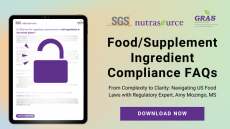Soup-To-Nuts Podcast: The business case for kosher certification

Ethical claims cover everything from prompts to recycle packaging to buy-one-give-one schemes to saving the rainforest or paying farmers higher prices. And while all of these are noteworthy causes, the ethical claim that leads the pack in the US is kosher.
According to Euromonitor, the US Kosher label market was worth $118 billion in 2015, which is higher than the omnipresent recycle label’s $114 billion and the all-natural label’s $25 billion sales in the same time period.
Given the size of the kosher pie, it is no wonder that more and more companies are seeking out kosher certification and making related claims. According to Mintel, 40% of new products launched in 2014 made kosher claims, which is up steadily from 36.3% the year before and 26.8% before that.
But what is behind consumer interest in kosher claims and what does it take to become certified? In this episode of FoodNavigator-USA’s Soup-to-Nuts Podcast Rabbi Menachem Genack, who is the CEO of OU – or Orthodox Union – Kosher has the answers. He also straightens out a few misconceptions about kosher certification, digs deeper into the marketing potential of kosher certification and discusses how kosher certification is evolving with the times and can help companies meet other emerging trends, such as clean label.
He explained that OU Kosher certifies close to 1 million products currently, including many ingredients that are the building blocks of finished products. He also said this number is growing for several reasons.
“Many people see the OU as a marketing advantage that represents not only the parochial market in terms of Kosher Jews, but also people who have other considerations,” he said.
For example, some consumers come to kosher products because they are lactose intolerant and know that kosher products generally are dairy free and if it is present it is clearly labeled, he said.Similarly, other religious groups gravitate towards kosher, including Seventh Day Adventists and Muslims.
Finally, he said, many people in the general population are drawn to kosher certification because they believe it represents a higher standard, is more wholesome or simply because they feel more comfortable knowing there is an inspector going in and another set of eyes looking at the plant.
Defining kosher
With so many different value sets attached to kosher, it can be confusing for consumers to understand exactly what the claim represents.
Genack explained that the fundamental rules are based in the Bible and the belief that discipline in daily activities, such as eating, can help achieve holiness. For food manufacturers though, key aspects including which types of animals are considered kosher and how they are slaughtered, a prohibition against meat and milk joined together and series of rules on production of ingredients and foods that must be closely followed.
“It is not only the ingredients, but also the equipment,” he added, explaining if the equipment is hot it has to be segregated and used only for kosher, but if it is used otherwise it can be “kosherized” by purging it with hot water.
What does it take to become certified?
With such broad consumer appeal, certifying products as kosher makes good business sense. And, as Genack notes, it isn’t as arduous as some certifications.
To get started, companies simply need to fill out a form on the OU’s website and then a team of experts will first ensure that all the ingredients are kosher, and if not that they are separated, and then inspectors come to “supervise” or inspect facilities to ensure they are following the rules, he said.
OU is even willing to send inspectors around the world to help companies that want to be kosher certified navigate increasingly global supply chains, Genack said.
Accessing emerging trends
Kosher certification can also help companies tap into other emerging trends, including the gluten free and clean label movements.
Genack explained that many people seeking gluten-free products also look for products that are certified as kosher for Passover because they know that these products, unless they are made with matza, will be gluten-free.
Similarly, Genack explained that the clean label movement shares the basic tenet of transparency with kosher certification
The bottom line
While almost any company would love to be able to access this many mega trends and consumer groups, the reality is that businesses have to look out for their bottom line and consider the cost of certification.
In that regard, Ganeck said most companies can achieve certification for less than $9,000 and, he added, 93% of first time OU Kosher-certified companies certify additional products after realizing sales increases directly attributed to the OU Kosher symbol on their packaging.





















